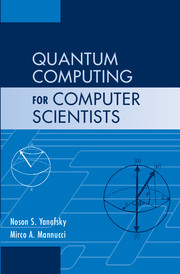Book contents
- Frontmatter
- Contents
- Preface
- Introduction
- 1 Complex Numbers
- 2 Complex Vector Spaces
- 3 The Leap from Classical to Quantum
- 4 Basic Quantum Theory
- 5 Architecture
- 6 Algorithms
- 7 Programming Languages
- 8 Theoretical Computer Science
- 9 Cryptography
- 10 Information Theory
- 11 Hardware
- Appendix A Historical Bibliography of Quantum Computing
- Appendix B Answers to Selected Exercises
- Appendix C Quantum Computing Experiments with MATLAB
- Appendix D Keeping Abreast of Quantum News: Quantum Computing on the Web and in the Literature
- Appendix E Selected Topics for Student Presentations
- Bibliography
- Index
8 - Theoretical Computer Science
Published online by Cambridge University Press: 05 June 2012
- Frontmatter
- Contents
- Preface
- Introduction
- 1 Complex Numbers
- 2 Complex Vector Spaces
- 3 The Leap from Classical to Quantum
- 4 Basic Quantum Theory
- 5 Architecture
- 6 Algorithms
- 7 Programming Languages
- 8 Theoretical Computer Science
- 9 Cryptography
- 10 Information Theory
- 11 Hardware
- Appendix A Historical Bibliography of Quantum Computing
- Appendix B Answers to Selected Exercises
- Appendix C Quantum Computing Experiments with MATLAB
- Appendix D Keeping Abreast of Quantum News: Quantum Computing on the Web and in the Literature
- Appendix E Selected Topics for Student Presentations
- Bibliography
- Index
Summary
The meaning of the world is the separation of wish and fact.
Kurt Gödel, quoted in Hao Wang's A Logical Journey: From Gödel to Philosophy, page 309In a sense, theoretical computer science is uniquely qualified to study quantum computing. After all, Alan Turing and the other founders of theoretical computer science studied formal computation long before engineers actually produced a real-life computer. At present, large-scale quantum computers are not a reality yet. Nevertheless, the theoretical analysis of quantum computability and complexity is well on its way.
In Section 8.1, we start with a quick review of some of the basics of deterministic and nondeterministic Turing machines and the complexity classes that they engender. However, we shall discuss them in a way that is easily generalizable for our purposes. Section 8.2 moves on to probabilistic Turing machines and their zoo of complexity classes. Our main objective is found in Section 8.3, where we meet quantum Turing machines and their complexity classes. We shall also state some basic theorems and ideas about quantum computation.
DETERMINISTIC AND NONDETERMINISTIC COMPUTATIONS
Theoretical computer science deals with the question, “What is computable?” We must immediately qualify the question: “computable according to which model of computation?” It turns out that if we omit the question of efficiency, all sufficiently complicated formal models of computation can simulate each other. However, in order to fix our ideas and notation, we have to stick with one and work with it.
- Type
- Chapter
- Information
- Quantum Computing for Computer Scientists , pp. 239 - 261Publisher: Cambridge University PressPrint publication year: 2008



